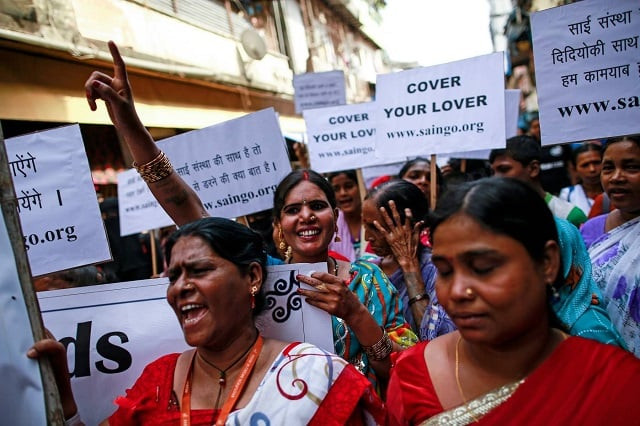Protect Indian sex workers' right to reject rehab, say campaigners after reports of abuse
Country's long-awaited anti-trafficking bill might lead to consenting sex workers locked up, treated like victims

PHOTO: REUTERS
The lower house of the Indian parliament cleared the anti-trafficking bill in July this year and it is expected to be tabled in the upper house in December.
India's women's minister has said it aims to unify existing anti-trafficking laws, prioritise survivors' needs and prevent victims such as those found in brothel raids from being arrested and jailed like traffickers.
Indian sex trafficking survivors take their #MeToo stories online
But sex workers' organisations say it does not distinguish between victims of trafficking and women doing sex work out of choice, and could lead to the latter being held in shelters against their will.
"There is a concern among sex workers' rights movements about adult consenting sex workers being incarcerated in protection homes," said Aarti Pai of the India-based National Network of Sex Workers.
The National Network of Sex Workers has made this point against shelters in its opposition to the bill.
Britain's Guardian newspaper on Saturday quoted former inmates of a shelter in Hyderabad run by anti-trafficking charity Prajwala as saying it was worse than prison and that they were beaten and forced to work unpaid.
"You can't force rehabilitation on survivors who reject it," said Devi, a women's rights activist who goes only by her first name.
"Why can't a shelter home be an open house – if a person doesn't want to learn, let her go. They (those in sex work out of choice) are sent as trafficking victims to these homes," she told the Thomson Reuters Foundation.
Most of the more than 23,000 trafficking victims rescued in 2016 were women and girls, according to government data. Rescued survivors are taken to hostels run by charities or the government.
"Shelters are required as a transit space for any human being who is grievously traumatised to gain the coping skills to reintegrate into the society," Prajwala founder Sunitha Krishnan told the Thomson Reuters Foundation.
Prajwala is a member of TrustLaw, the Thomson Reuters Foundation's global pro bono legal programme.
In a blog post Krishnan said the "care and protection provided in Prajwala is the best".
She said the allegations made in the report were an attempt to discredit her rehabilitation model.



















COMMENTS
Comments are moderated and generally will be posted if they are on-topic and not abusive.
For more information, please see our Comments FAQ